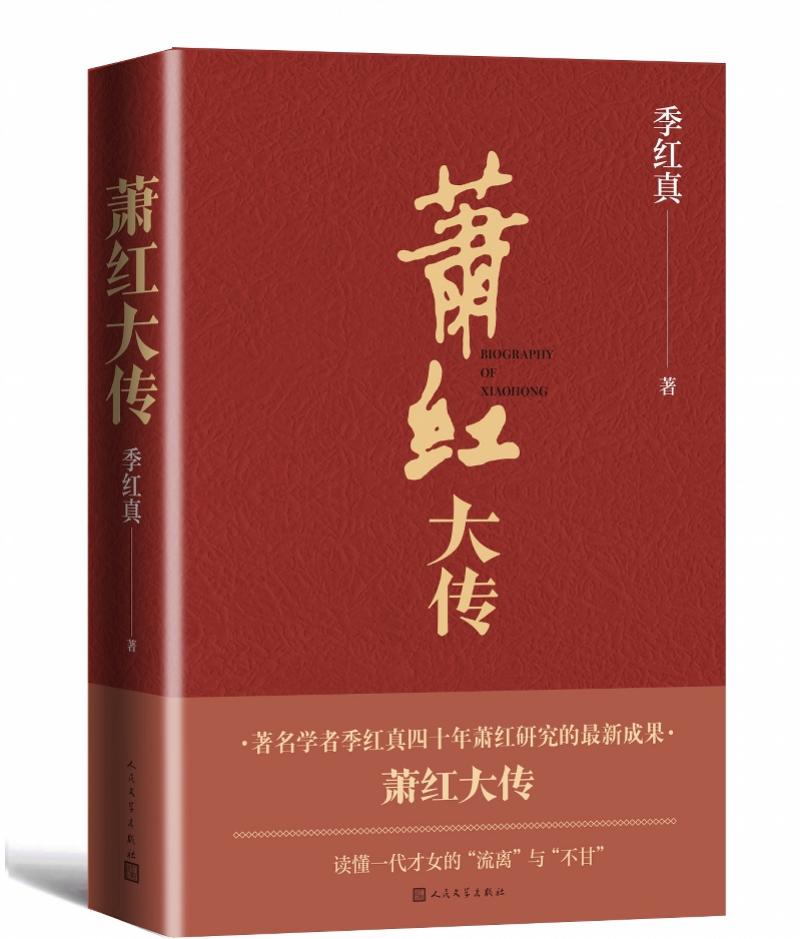2021 is the 110th anniversary of Xiao Hong's birth, and the People's Literature Publishing House recently launched the famous scholar Ji Hongzhen's "Xiao Hong's Biography". This is a biography of Xiao Hong's wandering and lonely soul that the author has completed in 40 years, truly and comprehensively restoring the tragic life of Xiao Hong, the "daughter of Hulan River", with more than 500,000 words and more than 20 illustrations, teaching us to understand the "displacement" and "unwillingness" of a generation of talented women.

Xiao Hong, one of the best writers of the twentieth century, together with Zhang Ailing, Lü Bicheng and Shi Pingmei, is known as the "Four Talented Women of the Republic of China". She was praised by Lu Xun as "the most promising female writer in China today", and was praised by Liu Yazi as having "the will to lift the heavens and the talent of the world", in her short life of thirty-one years, in less than ten years of creative career, she left us nearly a million hot words written in blood, such as "The Field of Life and Death", "The Legend of Hulan River" and the unfinished "Ma Bole".
Ji Hongzhen is a top scholar of Xiao Hong's research, a famous literary critic, essayist, biographical literary writer, "The Conflict between Civilization and Ignorance" won the 1988 Chinese Contemporary Literature Research Award, and "Ignorance of Mankind" won the first "Xiao Hong Research Award". The Biography of Xiao Hong is Ji Hongzhen's third book published by the People's Literature Publishing House after Portrait of the Gods (1994) and Drift (2015). This is the latest achievement of her forty years of research on Xiao Hong, cutting from a female perspective, close to the deep and broad spiritual world of another talented woman, and a high spiritual fit with the two hearts of the Master, thus presenting us with a more real, three-dimensional and vivid image of Xiao Hong. This is also the key to the difference between "Xiao Hong's Biography" and other Xiao Hong biographies on the market.
On June 5th, the commemoration of the 110th anniversary of Xiao Hong's birth and the sharing meeting of the new book "Xiao Hong's Great Biography" were held in the Lecture Hall of Block A of the Capital Library. Generations of famous scholars in the field of modern Chinese literature and cultural studies: Zhao Yuan, Sun Yu, Yang Lianfen, Yuan Quan, Yao Dan, Guo Juan, etc., joined us in Xiao Hong's "naïve" and illegitimate life through Xiao Hong's compassionate and spiritual words.
The scene of the new book sharing meeting
Sun Yu believes that Xiao Hong inherits the texture of Lu Xun's literary creation, especially in the writing of novels and prose, the original, yuanqi, and authentic life experience, which is Xiao Hong's tradition of connecting with Lu Xun. In his view, Xiao Hong is a miracle in the development of modern literature. "During the War of Resistance Against Japanese Aggression, many writers could not write works, and once they were written, they were all slogans and conceptual carriers, but Xiao Hong was rooted in the black soil of the northeast, and at the same time, she was deeply entangled with China's national difficulties and China's modern history. This transcends the left wing, which carries the cultural background of the left, but also transcendence."
For Yuan Quan, Xiao Hong's goodness cannot be said, she cannot be classified, irreplaceable, and cannot be repeated. Her words have their own light, which sounds childish, but it is also very expressive.
"The vast majority of her prose can be recognized as her autobiography. But her novels are not like this, her novels have very obvious folk colors, grassroots, very compassion. In Xiao Hong's novels, people are like ants, very low-level, very humble, but because the writer injects hard work, love and sympathy, it is particularly empathetic.
Yuan Quan said: "Why do we read Xiao Hong today? Some of the problems she encountered back then, her predicament as a woman, also plague women today. Including marriage, poverty, illness, including career and family relationships, today is also very confusing to contemporary women. Therefore, Xiao Hong's topic is endless, and Xiao Hong is also meaningful at the moment. ”
Yao Dan believes that "The Great Biography of Xiao Hong" is a big woman writing another big woman. She summarized the three characteristics of the master in "Xiao Hong's Great Biography": the first is national consciousness, women in national wars; the second is Xiao Hong's class consciousness; the third is her gender consciousness. Yao Dan said: "I think among these three consciousnesses, the strongest is gender consciousness. But we should also note that Xiao Hong himself said at the symposium held by Hu Feng that writers are always ignorant of human beings. I think this may be Xiao Hong's real motivation for writing, the writer is always towards human ignorance, but she looks forward to light and warmth. ”
The participating experts spoke highly of the academic value of the book "Xiao Hong's Great Biography", believing that this book clarified many ambiguities and doubts in Xiao Hong's life, and many contents in the book, such as the investigation of Xiao Hong's background, the examination of Wang Enjia's life and mysterious disappearance, the combing and identification of relevant historical materials in Xiao Hong's research, the truth-seeking spirit of "nowhere and no history" in the whole book, the doubtful and open narrative structure, and academic logic, all showed a very high academic connotation, which contributed greatly to promoting the further development of Xiao Hong's research.